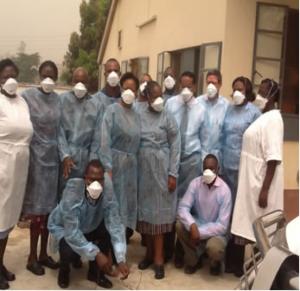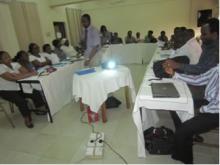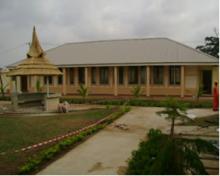WHO Nigeria Support for Rapid Scaling-Up of Programmatic Management of Drug-Resistant Tubercloisis in Nigeria
Though TB control and prevention efforts in Nigeria has progressed relatively well over the almost two decades of the introduction of the DOTS Strategy, it still constitutes a public health challenge.
According to the WHO Report of 2011, Nigeria now ranks 10th among the High Burden countries for TB in the world. The emergence of drug resistant TB and relatively high burden of HIV/AIDS have impacted negatively on TB control and prevention efforts. The 2011 WHO report also states that Nigeria has an estimated MDR-TB rate of 2.2% and 9.4% among new and re-treatment TB cases, respectively, and is therefore ranked 15th among the 27 High Burden Countries for MDR-TB. It is among the 4 African countries with the highest burden of drug-resistant TB. Cumulatively, only 142 confirmed MDR-TB cases out of the estimated 9,000-13,000 cases have been notified to the National TB and Leprosy Control Programme NTBLCP) between 2006 and 2011. This is indeed a tip of the iceberg
In response to the threat of DR-TB to effective control and prevention of TB, the Federal Ministry of Health in collaboration with WHO and other partners have put in place structures for the initiation and expansion of the programmatic management of drug-resistant TB (PMDT) in the country. There is a functional national DR-TB Committee and policy guidelines on PMDT are in place. The enrollment of MDR-TB for treatment with second-line anti-TB drugs started in July 2010 at the only functional MDR-TB treatment centre at University College Hospital, Ibadan. The model of care involves an initial hospitalization until sputum culture conversion followed by ambulatory phase of treatment either in the nearest DOTS facility. The NTBLCP is now set to expand the implementation of PMDT.
Milestones in the Implementation PMDT: As a major technical partner of the NTBLCP, WHO has continued to play key roles in many critical aspects of PMDT implementation in Nigeria.
Funding and Policy Issues: Leveraging of GFATM grant to support the National Scale plan for the programmatic management of drug-resistant TB (PMDT). Grant was signed in July 2011 between the Global Fund and the Institute of Human Viroloy of Nigeria (IHVN) as the Principal Recipient (PR); development and finalization of the National Guidelines for the Clinical and Control of Drug Resistant TB in Nigeria. The NTBLCP leveraged funds from WHO to develop and finalize of DR-TB training guidelines to ensure the standardization of training for all facilities and field health workers providing DR-TB management services.
Infrastructural Development: With support from KNCV/TBCARE 1, the Xpert MTB/RIF technology has been deployed in 9 facilities, namely, National Reference Laboratories in Lagos and Zaria, Chest Hospital Jericho-Ibadan, Infectious Disease Hospital (IDH) Kano, Specialist Hospital Gombe, Mile 4 Mission Hospital, Abakilike, Central Hospital Benin-City and Zankli Medical Centre Abuja. This is already improving access to rapid and early diagnosis. WHO participated actively in the planning meetings for the selection and assessment of the facilities for the deployment of the Xpert machines. The BSL 3 Laboratory at the National Reference Laboratory/Nigerian Institute of Medical Research NRL/NIMR) Lagos is almost ready but the BSL 2 section is fully functional. The two NRLs, in Lagos and Zaria have capacities for solid/liquid culture and DST as well as for LPA and Xpert MTB/RIF. Five additional DR-TB Treatment Centres are now ready and will begin the enrollment of confirmed MDR-TB patients for treatment on Second Line Anti-TB Drugs (SLDs) in the first week of March 2012. These facilities are located at Dr Lawrence Henshaw Memorial Infectious Disease Hospital, Calabar (14-bed capacity); Lagos Mainland Hospital (40 bed capacity); Jericho Chest Hospital, Ibadan (25 bed capacity); National TB and Leprosy Training Centre, Zaria (40 bed capacity) and Infectious Disease Hospital, Kano (25 bed capacity).
Human Resource Development: WHO provided technical support for the training on DR-TB management for 27 of medical and health workers from three of the newly established DR-TB treatment Centres at Calabar, Ibadan and Lagos. Plans to train the medical and health workers from the other centres at Kano and Zaria have been concluded. Plans are also in place to train the programme staff at all levels on PMDT.
These training activities will facilitate the effective and systematic decentralization of PMDT in the country. NTBLCP has also trained a critical pool of core trainers the M& E aspect of DR -
Drugs Logistics and Patient Treatment: So far two cohorts of 61 MDR-TB patients (23 in 2010 and 38 in 2011) have been enrolled on treatment. The interim treatment outcome so far shows that 41 have converted and now on ambulatory treatment (after the initial hospital treatment); 11 are still on admission while nine have died. The NTBLCP took delivery of SLDs for 110 MDR-TB patients. WHO has continued to play important role in strengthening patient management and in the clearance of the drugs on behalf of the NTBLCP.
Programme Monitoring and Routine Surveillance: Working in collaboration with the NTBLCP and other partners, WHO supported the adaptation of the recording and reporting formats for DR-TB, which have been printed and available for use in the field. Technical support is also provided in the development and establishment of routine surveillance system for DR-TB. As part of the scale up plan, a system of routine culture/DST for all identified re-treatment cases is now place. From both the conceptual and operational points of view, routine culture/ DST will be expanded to other risk groups over the next few years as more resources become available. NTBLCP in collaboration with MSH leading other partners including WHO have customized the E-TB manager for documentation and monitoring purposes.
Operational Research: Through funding support from WHO/Geneva, the NTBLCP in collaboration with other partners conducted an operational research on operationalizing Community-based DR-TB care in the country. The findings are insightful and provide operational contexts to guide the development of models for community-based DR-TB control and prevention in the country.







